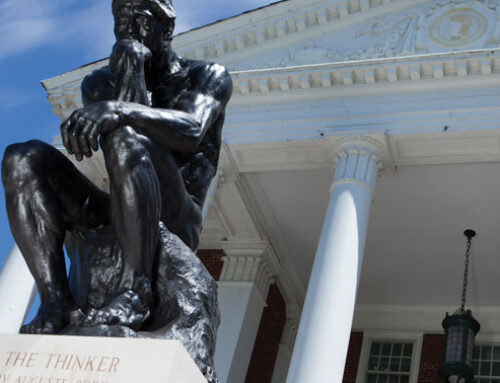— Quintez Brown
Mickey Hess and Kaila Story teamed up for a co-presentation to discuss hip-hop and allyship with the black community.
Rider University professor and author of, “A Guest in the House of Hip-Hop: How Rap Music Taught a Kid from Kentucky What a White Ally Should Be.” Hess is also a University of Louisville alumnus.
Story is an associate professor of women’s and gender studies at U of L and co-hosts the podcast “Strange Fruit: Musings on Politics, Pop Culture, and Black Gay Life.”
The Honors Student Council, Engage Lead Serve Board, MLK Scholars Society and University Libraries hosted the dialogue. The discussion was a podcast-style interview where Story asked Hess some questions surrounding his recent book.
Before the questions began, Hess read the introduction of his book where he talked about growing up in racial isolation, white allyship and how hip-hop helped him better understand black identity.
After reading the introduction, Story delved into his “White Ally: Do’s and Don’ts” list he included in his book.
Story asked Hess to elaborate on what he meant when he said, “White people need to stop feeling about race, and start thinking about race.”
Hess explained that conversations around race tend to make white people defensive and emotional. He references Robin DiAngelo’s book, “White Fragility: Why It’s So Hard for White People to Talk about Racism”.
He encourages white people to have logical, factual conversations about race.
“Remove any sense that you’re personally being attacked … look at the situation logically–look at facts.” Hess said.
Story then explains to the audience that Hess, as a white author, did an excellent job talking about his whiteness and the casual racism he grew up with in a racially isolated, small town in Kentucky.
“I never really read a book that discusses whiteness and racism and how they can address those things,” Story said.
Story asks Hess why it took hip-hop for him to learn about black culture and black history. Hess explains how public education whitewashes and minimizes black history to the month of February.
Hess takes it further to higher education by explaining that faculty at colleges and universities shy away from talking about race or cultural issues. Hess says this adds a lot of extra pressure to incoming young black faculty.
While discussing the chapters, Hess talks about white resentment to black success, analyzing racism through social networking and the competition between white allies.
Freshman student Mckenna Jobe, said they enjoyed the perspectives that Hess and Story brought to the discussion.
“I definitely learned a lot. I’ve been really trying to work on my white allyship lately, and it really brought to light some of the things i’ve been wondering about and struggling with,” Jobe said.
Copies of Hess’s book can be bought online from retailers.
Graphic by Shayla Kerr / The Louisville Cardinal





